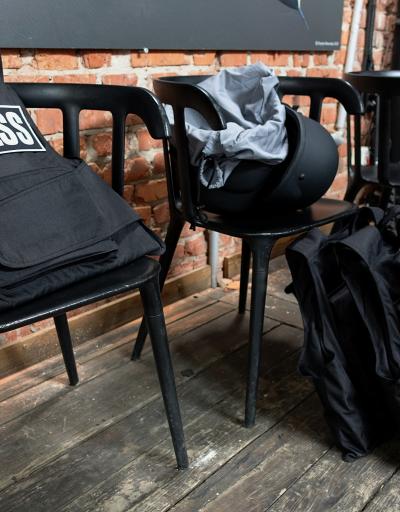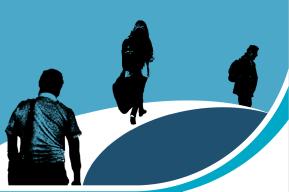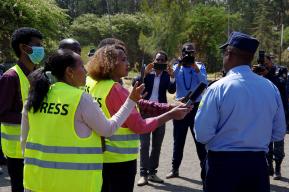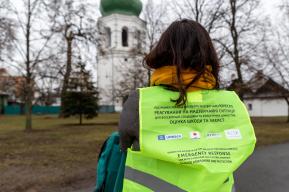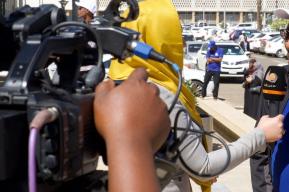Measuring the impact of the measures UNESCO has already taken, including supporting the establishment of a hotline for journalists in need, translating a manual on journalists’ safety, and providing protective equipment and training, was the purpose of a mission of a team of two UNESCO experts, Guilherme Canela and Saorla McCabe to Lviv, Ukraine on 21-22 April. The mission was also designed to assess the needs of journalists in Ukraine and suggest ways they could be met.
With over 5000 journalists accredited to cover the frontlines, many of whom do not have any prior experience of reporting in hostile situations, training on reporting in high risk environments, trauma journalism and psychosocial support, as well as further provision of safety equipment, was identified as an important priority by the UNESCO mission.
The mission was also an opportunity for UNESCO to exchange with the national and international partners with whom UNESCO has joined forces in providing an emergency response to support independent media in the country since the outbreak of the war.
Protective gear for journalists and fixers
At an event organized at the Press Freedom Centre, UNESCO handed over a batch of bulletproof vests and helmets to the National Union of Journalists of Ukraine (NUJU). The first vests were given to journalists from the news services of the “Ukraïna” and “Ukraïna24” TV channels. Local fixers, stringers and freelancers, who often are in a more vulnerable position, were also included among the beneficiaries of this safety equipment.
Alisa Koverda is a local fixer for foreign journalists and an interpreter. She underlines that fixers need to be included when considering the safety of journalists.
The UNESCO team visited the new Journalists’ Solidarity Centre opened by the National Union of Journalists in Ukraine (NUJU), in April to help journalists continue their work during the war. The centre can be used as a newsroom but will also offer training courses as well as equipment and financial assistance to journalists who have had to evacuate from other parts of Ukraine.
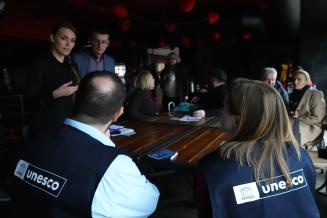
Information is the strongest weapon of this war. That is why it's so important that journalists on the frontline are protected as much as possible. For us who are part of the journalistic teams as local fixers and interpreters, assisting journalists to understand the context of this war, we find our work being valued through this kind of protection.
High-risk training is vital
The training courses will integrate UNESCO resources such as the UNESCO-RSF Safety guide for journalists reporting in high-risk environments, which has recently been translated into Ukrainian. Two similar centres have been opened in Ivano-Frankivsk and Chernivitsi.
Hundreds of journalists in need of support
Sergiy Tomilenko, President of NUJU, underlined that hundreds of Ukrainian journalists are in trouble today and in need of support.
"Every day we receive dozens of requests from colleagues, including safety equipment, humanitarian assistance and organizational support for those who have had to evacuate. UNESCO's contribution to the safety of journalists is significant” says Tomilenko.
Protective equipment for journalists in Ukraine is extremely important, because it is now very difficult to buy body armor or a helmet in Ukraine on your own” says Andrii Ianitskyi, a Ukrainian journalist at Espreso.TV. “First of all, protective equipment goes to the front for soldiers. So, it is simply difficult to buy it in Ukraine or even in neighboring countries.” The second difficulty is the price, he says. “A good protective kit costs at least 1000 euros. Often in Ukraine, journalists receive a lower salary per month. That's why UNESCO's help is so valuable.”
Hotline proved its value
One of the immediate asks of the Ukrainian journalists was to support the setup of a hotline for journalists in need. This has already proven its worth with over 100 calls during its first days in operation.
NUJU shared with UNESCO stories of two incidents where the hotline successfully assisted journalists in dire need, both foreign correspondents and a local newspaper editor who called the hotline for assistance.
The first case involved a TV crew of a British/Arabic network which was under siege for 4 days in early March near the town of Irpin and could not get out. Through coordination of the hotline staff and the National Union of Journalists, the TV crew escaped the siege accompanied by a group of civilians who joined the press team out of Irpin.
In a second incident, a local newspaper editor in Kharkiv region needed to escape from targeted shelling on his town. The editor felt his and his family’s lives would be threatened by staying longer and called the hotline for support. This evacuation was coordinated step-by-step by the hotline, by advising on routes to take to search for housing on the road, search for fuel and find housing in Western Ukraine after evacuation. The editor is now based in the Lviv region and has returned to active journalism.
The Press Freedom Centre, jointly run by Reporters without Borders (RSF) and the Institute of Mass Information (IMI), has received financial support from UNESCO. Located in central Lviv, it serves as a resource centre for journalists seeking financial or psychological assistance as well as a logistical hub.
UNESCO’s experts were also able to visit the Lviv Media Hub, a recent project of the Lviv Media Forum. The Hub has offered a shelter for some 60 journalists since the beginning of the war, and plans are underway to create a large co-working and networking space for online journalists
Protecting safety of journalists a priority for UNESCO
Addressing an audience of journalists at the Press Freedom Centre, Guilherme Canela, Chief of UNESCO’s Section for Freedom of Expression and the Safety of Journalists, opened the event by expressing UNESCO’s solidarity with the news media community covering the war and highlighted the huge challenges they are facing. He also expressed UNESCO’s tribute to those who have already lost their lives since the war started.
He made reference to the Nobel Peace Prize Committee which has said ‘freedom of expression and freedom of information help to ensure an informed public. These rights are crucial prerequisites for democracy and protect against war and conflict’. Therefore, Canela concluded, “protecting the safety of journalists reporting on war and conflicts is a priority for UNESCO”.
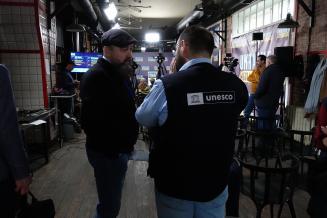
Journalists will need financial support
The media professionals and civil society actors with whom UNESCO met underlined the need for support for journalists who have had to relocate, including in terms of office space rental and equipment. Addressing the financial challenges faced by media outlets in the absence of advertising revenue was identified as one of the most urgent priorities.
Sergiy Tomilenko, the President of the National Union of Journalists in Ukraine is worried about the economic viability of the media in his country.
We appeal to the international community to also introduce economic stability programs for all Ukrainian journalists. In particular, salary financing programmes for journalists that would help support their professional activities and allow them to remain in the profession.
UNESCO’s activities in Ukraine are all part of UNESCO’s mandate to promote the free flow of information by word and by image. They were made possible thanks to support from UNESCO’s Multi-donor Programme for Freedom of Expression and Safety of Journalists, the regular budget of the International Programme for the Development of Communication, and the Global Media Defence Fund.
More on UNESCO’s response to support journalists and media in Ukraine


